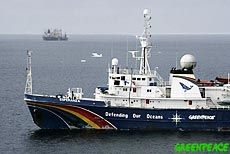
Ross Sea, Southern Ocean. The MY Esperanza in the foreground of the disabled Japanese whaling ship Nisshin Maru, a re-fuelling vessel and a hunter vessel tied alongside it. Fire broke out on the Nisshin Maru last Thursday and one man is still missing.The Greenpeace ship Esperanza is there to offer to assist the whaling fleet including possibly towing her out of the Southern Ocean.
Fate of the whales remains in question
Antarctica — Today the whaling fleet crossed the 60 degree latitude, leaving the whaling grounds behind – at least for this season. Officials in Tokyo have finally acknowledged publicly that the deadly fire crippling the fleet's factory ship means an early end to their hunt.
Melanie and Sakyo, on board the nearby Esperanza, radioed the whaling ships as they crossed the line, saying:
“We acknowledge your grief at the loss of your crewmember, and we also acknowledge the work you have done, day and night to repair your ship, but this must be the last time your government sends you to the Southern Ocean to hunt whales and threaten the Antarctic environment. For the sake of the environment, the whales and your crew – never again!”
The future of whaling?
The reported catch this year was 505 minke whales and three endangered fin whales. Next season, the whalers say they will return to hunt up to 935 minke whales, 50 endangered fin whales and 50 threatened humpback whales.
This year's whaling highlighted the risks the Japanese government's whaling program posses to the Antarctic environment, and their ships' crew. International outrage at Japan's unilateral hunt in an agreed whale sanctuary remains high.
Inside Japan, questions are surfacing about the wisdom of the government's whaling programme. Reports in Japanese media have been unprecedented in their even-handedness, and even positive, portrayals of our campaign to end commercial whaling.
That this hunt damages Japan's credibility, wastes millions in taxpayer's money and puts lives at risk is sinking in. And most importantly, people are realizing it's possible to be against whaling, while still loving Japan.
Next stop: International Whaling Commission
The International Whaling Commission (IWC) is the world's authoritative body on whaling. For years now, the Japanese government has been using diplomatic pressure and a vote buying program to stack the IWC with pro-whaling allies, and threatening to leave the organization if they don't get their way.
Last year the whaling faction showed they could muster a narrow majority at the IWC. This year, at the end of May, the IWC will meet in Anchorage, USA. Everyone who cares about the future of whales in our oceans should help prepare for this meeting.
The website whales.greenpeace.org can help. There, you can find ideas you can make happen, or post an idea of your own – then work with others to make it a reality.
Greenpeace Aotearoa New Zealand
www.greenpeace.org/new-zealand/






